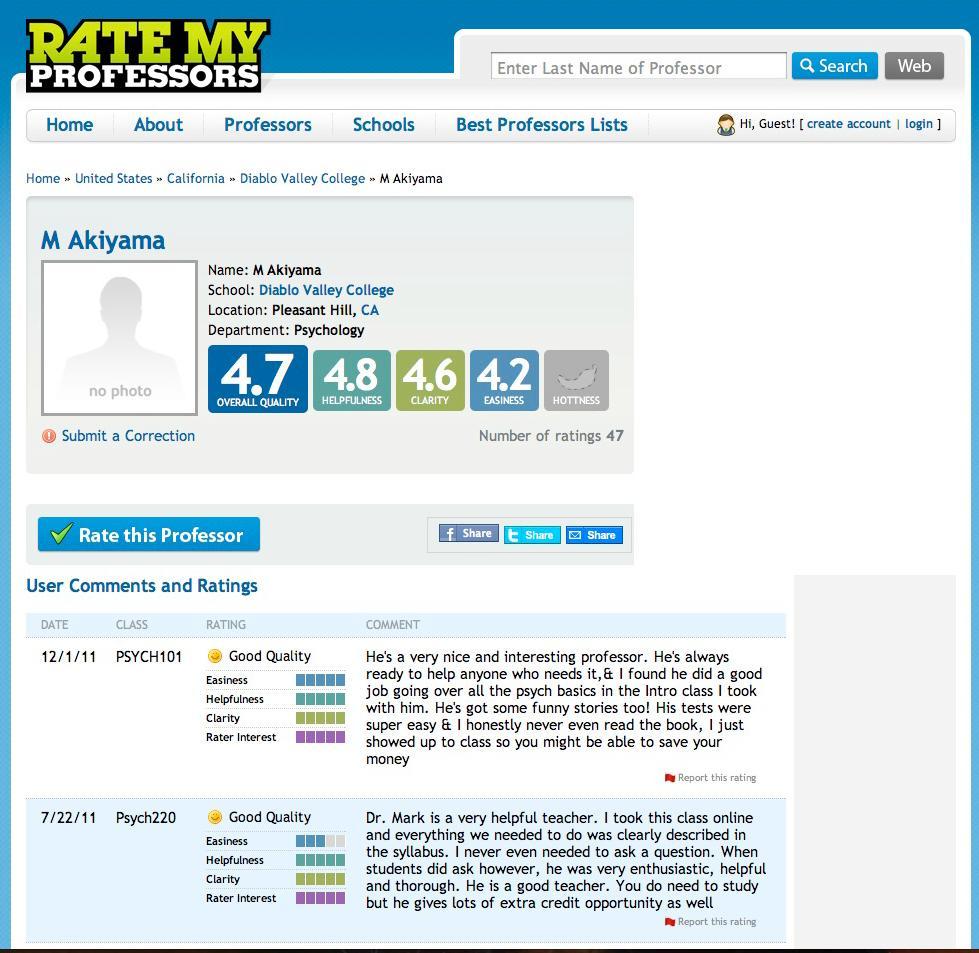Websites like Yelp, Angie’s List and Urban Spoon allow consumers to share opinions on the services they pay for, be it the quality of a crepe, the beauty of a painter’s work, or the atmosphere of an Asian bistro.
However, one website which allows students to review the services of the professors they put their tuitions toward has stirred up unmatched controversy.
The ability to tell fellow students, as well as the professors themselves, how well they teach, how difficult their material is and how attractive one considers them to be is surely being taken advantage of. Over 13 million reviews have been written.
RateMyProfessors.com has been criticized as inaccurate and as little more than a tool used to fulfill the “vendetta” of a disgruntled student; the site says that “well over half of the ratings” are positive.
“I use it every semester for every class that I’ve taken,” said DVC student Derek Leung. “The first couple of years, my grades weren’t that good because of my teachers. But, since I’ve started using Rate My Professors, my grades have improved because I’ve been able to find professors who teach in a style that I can learn to.”
Critiques regarding accuracy include this statement from The University of Alabama’s Office of Information Technology: “While some teachers may have taught thousands of students, they may only have 90 comments. So, what does this mean for the margin of error?”
Rate My Professors was the first in this decade’s growing emergence of student-centered social media sites which includes Reddit.com and Facebook.
Reddit consists of a collection of pages which focus on topics like “Today, I learned…” “WTF” and “Atheism.”
The site has a history of being the home of social rallying as in 2010, members put forth an initiative that Stephen Colbert “Rally to Restore Sanity and/or Fear” which was responded to and held in Washington, D.C.
Rate My Professors is used as an instructor/campus-reviewing system whereas Reddit supplies message boards so that students can communicate with one another. Students share sentiments such as which bathroom at school they favor most, what graffiti they’ve noticed and, “What’s with that statue in front of the library?”
DVC’s personal Reddit page is home to these questions and more, as well as being the home of a few displeased students’ complaints.
One student writes, “The sign [in the Admissions office] reads that DVC wants to provide outstanding service with a ‘students first’ philosophy. There is only one window open, with only one person working at which priority is given to staff. I asked if there is only one person working and staff ‘snarkly’ confirmed this.”
The student proposed that officials “Take down that sign and stop pretending or hire some people and stop wasting your student’s valuable time.”
Although many students consider the raiding of Rate My Professors a valuable strategy when choosing instructors for their courses, the reliability and accuracy of reviews has been widely questioned. The argument that one of the key categories instructors are rated on, “Easiness,” fails to target the facets of teaching that are most important has led many to write the website off as a mecca for angry students, searching for a place to rant about the unfairness of life. In factuality, the site comes up with a rating based only on “Clarity” and “Helpfulness.” “Easiness” is a category that was added purely due to its interest to the students.
In a recent study published in The Chronicle of Higher Education, researcher April Bleske-Recheck, associate professor of psychology at the University of Wisconsin, Eau Claire and student Amber Fritsch found that not only were the number of reviews indifferent to the overall rating of the professor but that there was “strong student consensus about instructor quality…Trends in student ratings on RateMyProfessors.com mirror those found on traditional student evaluations of teaching (Coladarci & Kornfield, 2007; Sanders et al., 2011)….RateMyProfessors.com is providing useful feedback about instructor quality.”
Bleske-Recheck has 42 total ratings on the site with an overall rating of 4.2, while her easiness is 2.5.
In contrast, of the 961 professors rated for DVC, the majority of the 5.0 ratings (the best score possible) are due to the fact that only one review has been written for that professor.
Two of the top-scoring professors (with the highest number of ratings in relation to score) are Patty Leitner, Mathematics and Kimberly Taugher, Biology, who both currently stand at 5.0. They’ve each been rated 11 times.
Leitner, who was unaware of her rating, said, “That’s fantastic. I’m a little bit surprised.” When asked what about her teaching style she thought students were responding to, she said she makes an effort to “explain things clearly” and “tries to make sure that every single student really gets it – not just the ones that are naturally good at math.”
Psychology instructor M. Akiyama has 47 ratings with an overall score of 4.7 while John Freytag, Science, has 45 written reviews, a score of 4.6 and an easiness scale of 2.3.
In 2008, University of South Florida instructor Scott Grizzard, who teaches Economics, wrote a personal response “to the one person who gave me a not-so great review on RateMyProfessors.com.”
“All of the other instructors I have talked to have told me not to obsess about student ratings,” he writes, “but I view my class as my product like a small business owner views his product, and you are the customer. I care about customer experience and satisfaction.”
He then goes on to address the student directly: “I am sorry you had a bad experience in my class. Economics is a very tough subject, and it was always my intention to try to make my class engaging and relevant (hence, tangents). You have to work hard at economics, and most students don’t realize how tough the subject is, and consequently don’t study enough for tests.”
While some professors have taken to “obsessing” over their reviews as Grizzard has, The University of Alabama’s Office of Information Technology says that, “an instructor has the option of removing any posts believed to be slander.”
In an article from Wired Magazine, founder of Rate My Professors, John Swapceinski who created the website when he was himself a student at San Jose University, is quoted as stating that he receives lawsuit threats “pretty much on a weekly basis.”
Business Professor David Mease of San Jose State University received the number one spot in the “Professor Top Lists” for the 2010-2011 year.
Bay Area four- and two-year schools received a number of the honors; Anna Marie Hibble of San Francisco State ranked number three “Hottest” professor, Diane Pirtle of Cerritos College at number nine was best “Junior College Professor” overall and the University of California, Berkeley received number six “Highest Rated University.”
DVC’s student consensus seems to be clear.
“It’s a pretty valuable tool ‘cause it lets everybody’s voice get heard…for the most part,” said Criminal Justice major Nick Barton.












































































